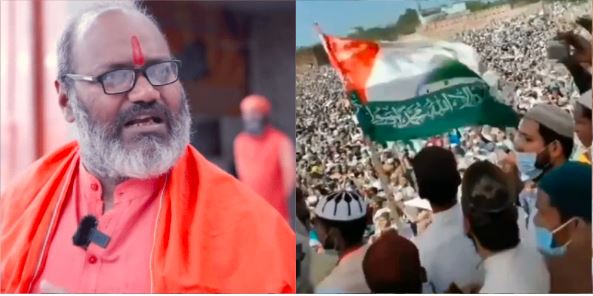Swami Yati Narsinghanand Saraswati of the Dasna temple is leading a courageous fight against Islamists and their bloodthirsty ideology. The head priest of the Dasna Devi temple has demanded that Hindus must have the right to comment on the fundamental principles of Islam and on the Prophet of Muslims as well, without fearing any backlash. That would truly mean that India is a country where freedom of speech is cherished. Islamists, however, did not like this proposition, and so did liberal mascots and cheerleaders of free speech rights. Now, they are calling for Yati Narsinghanand to be beheaded for blasphemy.
Lakhs of Islamists took to a protest rally in Uttar Pradesh’s Bareilly to openly call for the beheading of the Hindu priest. The clerics gave charged up speeches, and a fanatical crowd of mostly white-clad Muslims could not help but celebrate the slogans being blurted out. “Gustaakh-e-rasool ki ek se saza; sar dhar se juda, sar dhar se juda,” said one protest leader. Then, as the first half of the slogan was shouted from the stage, the Islamist mob uttered in unison the second part of the chant.
Another video from the same protest. The city remain true to the legacy of Imam Ahmed Raza Khan(RA) and Ishq-e-Mustafa (SAW)!
Gustakh-e-Rasool ki ek hi saza.. pic.twitter.com/SrlZFlmyrH
— Ramy (@Rammyyyyy_) April 9, 2021
TFI has already reported that Yati Narsinghanand faces an imminent threat to his life by Islamists and that if sufficient security is not provided to him, a re-run of the Kamlesh Tiwari killing cannot be ruled out. Apart from that, what the Indian government and parliamentarians also need to ponder upon is the validity of blasphemy laws in India. Section 295 of the Indian Penal Code criminalises insult to religion; it allows up to three years imprisonment and fines for “whoever, with deliberate and malicious intention of outraging the religious feelings of any class of citizens of India, by words, either spoken or written, or by signs or by visible representations or otherwise, insults or attempts to insult the religion or the religious beliefs of a class.”
In addition, in 2011 the Indian Ministry of Communications and Information Technology issued new rules requiring operators of social media networks to screen and remove blasphemous content within 36 hours of receiving a complaint. This, apart from the community laws which Islamists place above the Indian constitution, which by the way, consider the killing of a blasphemous individual a moral obligation for members of the said community.
Read more: Kamlesh Tiwari episode all over again: Lakhs of Muslims call for the beheading of Yati Narsinghanand
An annulment of such blasphemy laws is the need of the hour. Further, whoever tries to take the law into their own hands under the premise of theological blasphemy laws must be made to face severe punishment. Blasphemy laws have no place in contemporary society. Not only do such laws reek of fanaticism and extremism, but also become a means for some to kill anyone exercising their free speech rights or merely voicing their opinions – which may be uncomfortable to some.
Yati Narsinghanand Saraswati was speaking at an event held at the Press Club of India where he had called upon Hindus to be fearless in speaking about the characteristics of Prophet Muhammad.“If Islam’s reality, for which Maulana says, ‘If you speak about Muhammad, we will behead you’, Hindus should get rid of this fear. We are Hindus. If we can about the characteristics of Lord Ram, and other Hindu deities, then Muhammad is nothing for us. Why could not we speak about Muhammad and speak truth?” Yati Narsinghanand Saraswati had said.
As a free citizen of a free country, the man had every right to speak his mind, and those who threaten to kill him must be put behind bars immediately.
